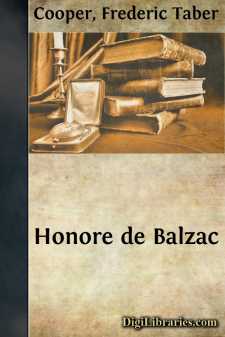Categories
- Antiques & Collectibles 13
- Architecture 36
- Art 48
- Bibles 22
- Biography & Autobiography 813
- Body, Mind & Spirit 142
- Business & Economics 28
- Children's Books 16
- Children's Fiction 13
- Computers 4
- Cooking 94
- Crafts & Hobbies 4
- Drama 346
- Education 46
- Family & Relationships 57
- Fiction 11829
- Games 19
- Gardening 17
- Health & Fitness 34
- History 1377
- House & Home 1
- Humor 147
- Juvenile Fiction 1873
- Juvenile Nonfiction 202
- Language Arts & Disciplines 88
- Law 16
- Literary Collections 686
- Literary Criticism 179
- Mathematics 13
- Medical 41
- Music 40
- Nature 179
- Non-Classifiable 1768
- Performing Arts 7
- Periodicals 1453
- Philosophy 64
- Photography 2
- Poetry 896
- Political Science 203
- Psychology 42
- Reference 154
- Religion 513
- Science 126
- Self-Help 84
- Social Science 81
- Sports & Recreation 34
- Study Aids 3
- Technology & Engineering 59
- Transportation 23
- Travel 463
- True Crime 29
Honore de Balzac
Categories:
Description:
Excerpt
Chapter 1.The Treatise on the Human Will.At Balzac's funeral, the glorious yet bitter seal upon his destiny, Victor Hugo delivered a magnificent address, and in his capacity as poet and seer proclaimed with assurance the judgment of posterity:
"His life has been brief yet full, and richer in works than in days.
"Alas! This powerful and indefatigable worker, this philosopher, this thinker, this poet, this genius has lived amongst us that life of storms, of struggles, of quarrels, of combats, which has always been the common lot of all great men. Today we see him at peace. He has escaped from controversies and enmities. He has entered, on the selfsame day, into glory and into the tomb. Henceforward he will shine far above all those clouds which float over our heads, among the brightest stars of his native land."
This discourse was admirable for its truth, its justice and its far-sightedness, a golden palm branch laid upon the author's tomb, around which there still arose clamours and bitter arguments, denying the greatness of his works, and rumours which veiled the features of the man behind a haze of absurd legends. A star of his country he certainly was, as Victor Hugo proclaimed him, one of those enduring stars which time—so cruel to others—fails to change, except to purify their light and augment their brilliance, to the greater pride of the nation. His life was indeed short, but it was one which set a salutary example, because, stripped of idle gossip, it teaches us the inner discipline, the commanding will and the courage of this hero who, in the midst of joy and sorrow alike, succeeded in creating an entire world.
Honoré de Balzac was born at Tours on the 20th of March, 1799, on the ground floor of a building belonging to a tailor named Damourette, in the Rue de l'Armée d'Italie, No. 25,—now No. 35, Rue Nationale. The majority of his biographers have confused it with the dwelling which his father bought later on, No. 29 in the same street according to the old numbering, and the acacia which is there pointed out as having been planted at the date of his birth really celebrated that of his brother Henri, who was several years the younger.
Although born in Touraine, Balzac was not of Tourainian stock, for his birthplace was due merely to chance. His father, Bernard François Balssa or Balsa, came originally from the little village of Nougaire, in the commune of Montirat and district of Albi. He descended from a peasant family, small land-owners or often simple day labourers. It was he who first added a "c" to his patronymic and who later prefixed the particle for which the great novelist was afterwards so often reproached. Bernard Balssa, born July 22, 1746, left his native village at the age of fourteen years, never to return. What was his career, and what functions did he fulfil? Honoré de Balzac says that his father was secretary to the Grand Council under Louis XV, and Laure Surville, his sister, wrote that under Louis XVI he was attorney to the Council....


